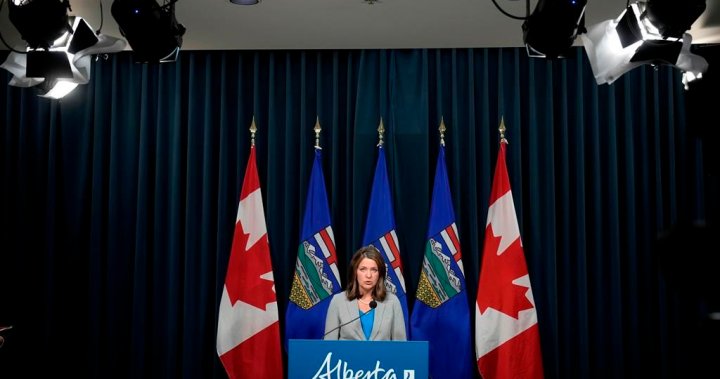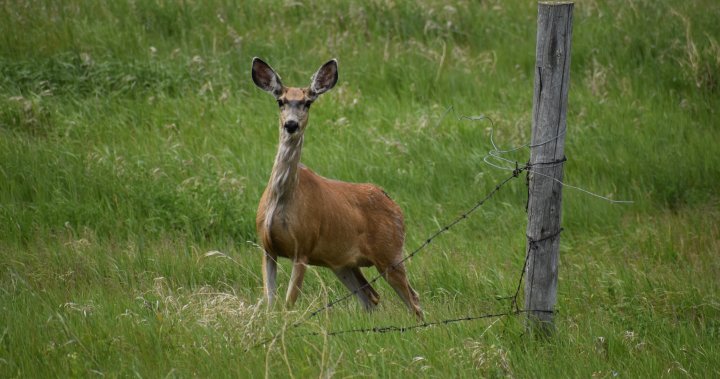Alberta Premier Danielle Smith says that her government is bringing in new rules around transgender kids wanting to use different names or pronouns in school and gender-affirming care due to what she describes as an “evolving” conversation.
“What we’re seeing is an evolving discussion in the public realm, not only in Canada but internationally, and you’re seeing different standards of medical practice being proposed,” Smith told The West Block guest host David Akin.
“We felt like it was important for us to make sure that we had guidelines that were understandable and acceptable. We believe the starting point should be that kids should not be making irreversible decisions.”
On Wednesday, Smith announced a suite of policy changes related to gender-diverse youth and sexual education. This includes the requirement for parental notification and consent if a child aged 15 or younger changes their name or pronouns at school. Youth aged 16 or 17 will not need parental consent, but parents will still be notified.
At a housing announcement in Waterloo, Ont., Friday, Prime Minister Justin Trudeau said that it’s important to look out for LGBTQ2 youths as they are at greater risk of homelessness and suicide than their peers.
“It is telling that the week after welcoming far-right American conservative Tucker Carlson to her province to sit with him on stage, Danielle Smith has now moved forward with the most anti-LGBT policies of anywhere in the country,” Trudeau said.
Saskatchewan’s similar pronoun policy was paused by a court injunction last fall.
Shortly after, Premier Scott Moe invoked the notwithstanding clause to move ahead with it.
Smith says she hopes the situation in Alberta does not come to that.
Get the latest Health IQ news.
Sent to your email, every week.
“So, I think because of that framework that we’re preserving the rights of children to make adult decisions as adults. I’m very hopeful that we won’t. It won’t come to that,” Smith said.
Also on The West Block, Employment Minister and Edmonton MP Randy Boissonault told Akin that he has constituents that are “quite rightly terrified” by what Smith is proposing.
“The state has no business in interfering in the development of a child, in the relationship that they have with their parents and what Danielle Smith is trying to do with this broadside on the LGBTQ community and really targeting, trans kids,” Boissonault said, “she’s trying to insert herself between kids and their parents. She’s trying to insert herself between kids and medical professionals. She’s trying to mandate that teachers out kids.”
Boissonault grew up in Alberta and says he was confronted with a lot of homophobia as a young person in the 1980s and ’90s, and did not come out as gay until he was in his 20s.
“It took me until 28 to tell my own parents. And why did I do that? Because it’s the last relationship in my network that I could tell. Because you actually don’t know if your parents are going to be with you,” he said.
Both the minister and premier say that a vast majority of Alberta parents just want what’s best for their kids.
Where they differ is Boissonault says there are a small minority of homes where youth don’t feel safe coming out.
“I’ve seen in Edmonton, up to 65, 70 per cent of the homeless kids come from the LGBTQ community. The numbers are as high in Calgary. They are numbers that we see across the country,” Boissonault said.
“These kids and other kids that could end up like these kids need the safe space of school because they haven’t yet figured out how to tell their folks.”
As part of Smith’s announcement, she pointed to child protection laws that can help in the event youths are put in danger in their homes.
Sex education in schools will also move to an opt-in basis. This includes lessons on gender identity and sexual orientation.
Smith says parents would have the chance to opt out of sex education for their kids at the start of the school year.
“If you’re going to have really consequential, difficult and highly charged conversations happening in the classroom, I think parents should also have the opportunity to opt in as well,” Smith said.
On the medical side, Smith’s policies would block the use of puberty blockers or hormone therapy for those 15 and under, unless they’ve already begun the process.
She also plans to ban gender-affirming surgeries for people under the age of 18.
Both the World Professional Association of Transgender Health (WPATH) and the Canadian Paediatric Society do not recommend surgical interventions for trans youth.
However, they both say hormone therapies and puberty blockers can be beneficial treatments at the early onset of puberty to avoid the development of secondary sex characteristics (like developing breasts or an Adam’s apple) that could make future surgeries more difficult.
Both also point to mental health benefits of hormone therapy by avoiding or delaying some potentially irreversible changes brought on by puberty.
Smith makes a similar argument for why she intends to block hormone therapies for kids 15 and under.
“There’s a difference of opinion in the medical profession about at what point a child becomes mature enough to make life-changing decisions that are irreversible. And there are many practitioners who believe that that happens somewhere around the age of 16,” she said.
“So that’s the reason why we identified that age 16 and 17 is when a child would be able to commence the therapy on with using hormones, with the support of their families, their psychologists, and also their medical practitioner.”
Puberty starts at different times for everyone, but according to the Canadian Paediatric Society it usually starts between the ages of eight and 13 for girls.
For boys, they say it normally starts between nine and 14.
© 2024 Global News, a division of Corus Entertainment Inc.




